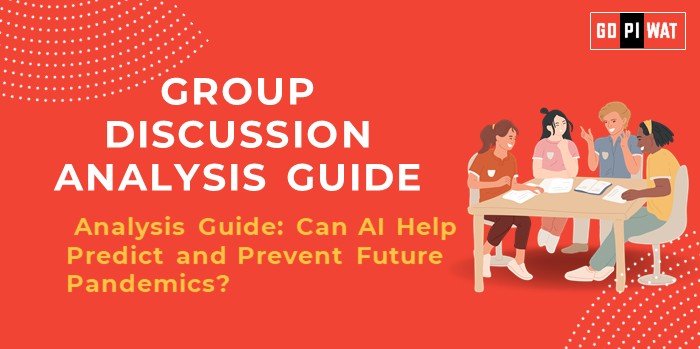📋 Group Discussion Analysis Guide: Can AI Help Predict and Prevent Future Pandemics?
🌐 Introduction to the Topic
- Opening Context: The COVID-19 pandemic highlighted the need for advanced tools to combat infectious diseases. Artificial Intelligence (AI), with its data analysis capabilities, has emerged as a potential game-changer in predicting and preventing pandemics.
- Topic Background: AI’s role in health began with its applications in diagnostics, personalized medicine, and data-driven research. Its ability to analyze vast datasets for early detection of outbreaks has brought it into the limelight as a tool for pandemic preparedness.
📊 Quick Facts and Key Statistics
- 📈 AI in Health Analytics Market: Valued at $1.3 billion in 2022, projected to reach $5.1 billion by 2030. (Shows growing investment in AI for health applications.)
- 🔍 Disease Monitoring: AI models detected COVID-19 in December 2019, weeks before WHO declared the outbreak. (Demonstrates early warning potential.)
- 🌍 Global AI Adoption in Health: 56% of countries have integrated AI into health surveillance by 2023. (Indicates widespread recognition of AI’s benefits.)
- 💰 Cost of Pandemics: $12 trillion in global GDP losses due to COVID-19 (2019-2021). (Stresses economic motivation for preventive tools like AI.)
👥 Stakeholders and Their Roles
- 🏛️ Governments: Develop AI-driven national surveillance systems and collaborate on global health data sharing.
- 🌐 Health Organizations (WHO, CDC): Standardize AI applications for outbreak tracking and monitoring.
- 💻 Tech Companies (Google, Microsoft): Innovate AI solutions for disease prediction and vaccine development.
- 🎓 Academia and Research Institutes: Train models on health data to improve accuracy.
- 🧑🤝🧑 Citizens: Provide anonymized health data to enhance AI systems.
🏆 Achievements and Challenges
✨ Achievements:
- 🔍 Early Detection: AI detected Zika virus hotspots using environmental and travel data.
- ⚕️ Resource Optimization: AI predicted hospital resource needs during COVID-19 surges.
- 💉 Precision Vaccination Campaigns: Models identified high-risk areas for targeted immunization efforts.
⚠️ Challenges:
- 📉 Data Gaps: Inconsistent health data sharing across countries limits AI accuracy.
- 🔒 Bias and Privacy Concerns: Algorithms may reinforce biases, and patient data security remains a concern.
- 🌍 Infrastructure Barriers: Low AI adoption in developing countries due to technology and skill gaps.
📄 Structured Arguments for Discussion
- Supporting Stance: “AI has proven its value by detecting outbreaks early and optimizing resource allocation during pandemics like COVID-19.”
- Opposing Stance: “Dependence on AI can be risky due to data biases and insufficient adoption in low-income regions.”
- Balanced Perspective: “AI complements traditional tools by enhancing speed and accuracy, but ethical and infrastructural issues must be addressed.”
💡 Effective Discussion Approaches
- Opening Approaches:
- “AI predicted the Wuhan outbreak weeks before it gained global attention.”
- “Pandemics cost trillions—AI offers an efficient solution to mitigate these impacts.”
- Counter-Argument Handling:
- Use case studies, like AI-driven COVID-19 vaccine distribution, to counter claims of inefficiency.
- Emphasize ongoing regulatory efforts to address ethical concerns.
🔍 Strategic Analysis (SWOT)
- Strengths: Rapid analysis of big data, early detection capabilities, predictive accuracy.
- Weaknesses: Data biases, regulatory challenges, limited adoption in under-resourced regions.
- Opportunities: Partnerships for global health initiatives, AI in personalized vaccine development.
- Threats: Ethical concerns, cybersecurity risks in health data storage.
📚 Connecting with B-School Applications
- Real-World Applications:
- Projects on AI in healthcare supply chains, predictive analytics in public health.
- Sample Interview Questions:
- “What are the limitations of AI in preventing pandemics?”
- “Can AI replace traditional public health monitoring systems?”
- Insights for B-School Students:
- Focus on the intersection of AI and global health policies.
- Explore startups innovating in health tech.


